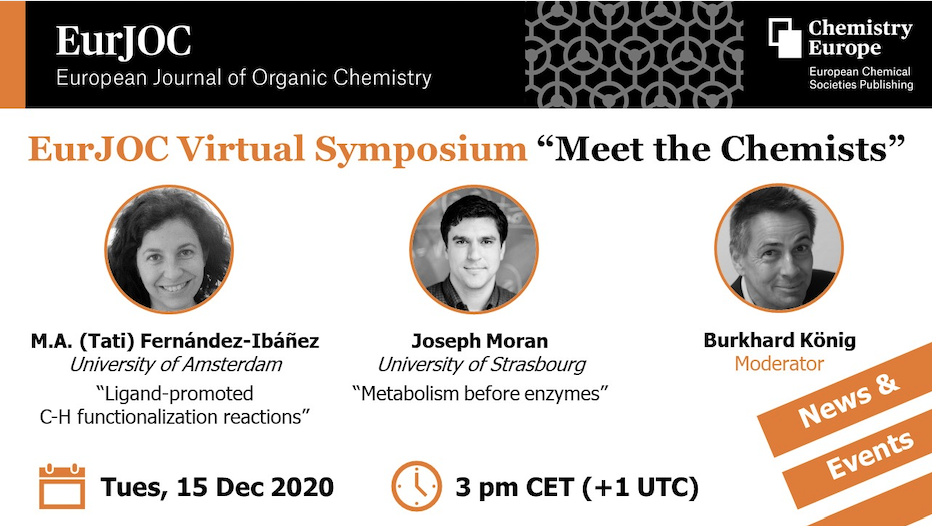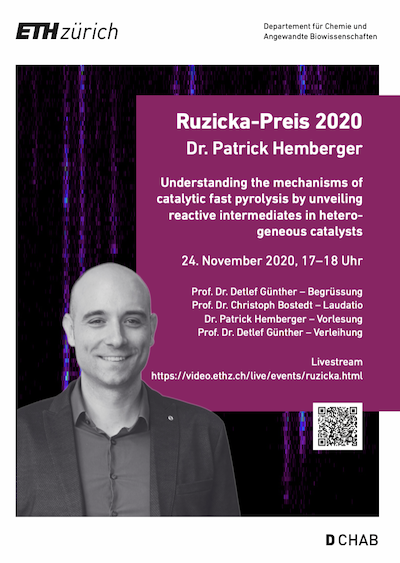SCS Award Winners 2021

It’s our pleasure to announce the winners of the 2020 SCS Awards. We would like to sincerely congratulate all winners for their outstanding scientific contributions, and we are looking forward to the award ceremonies and lectures that will take place at one of our upcoming SCS events.
Werner Prize 2021
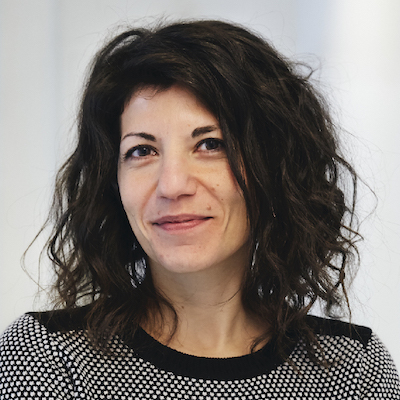 Prof. Raffaella Buonsanti,
Prof. Raffaella Buonsanti,
EPFL Lausanne,
for her original and significant contributions in the chemistry development of tailored nanomaterials and their applications in catalysis, especially CO2 electroreduction.
The award lecture takes place at the SCS Fall Meeting 2021 on September 10.
Sandmeyer Award 2021
 Casale SA and Clariant, namely
Casale SA and Clariant, namely
Dr. Pierdomenico Biasi, Mr. John D' Alessandri, Mr. Ermanno Fillippi Mr. Sergio Panza, Casale SA and
Dr. Rene Eckert, Dr. Marvin Estenfelder, Dr. Stephan Reitmeier, Dr. Andreas Reitzmann, Clariant AG
for their achievements obtained in the field of catalysis and reaction engineering, especially for the development and implementation of the AmoMax®-Casale, a new catalyst for a greener and less energy consuming process for industrial large scale ammonia synthesis.
The award lecture takes place at the SCS Fall Meeting on September 10, 2021 and at the Freiburger Symposium on April 23, 2021.
SCS Senior Industrial Science Award 2021
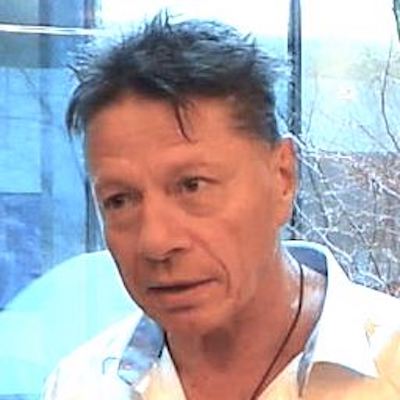
Syngenta Crop Protection AG,
for his impressive track record of achievements in the field of chemistry and crop protection reflected in 140 patents, 28 publications and more than 20 lectures at universities and international conferences.
The award lecture takes place at the SCS Fall Meeting 2021 on September 10.
SCS Industrial Science Award 2021
 Dr. Cornelia Zumbrunn,
Dr. Cornelia Zumbrunn,
Idorsia Pharmaceuticals Ltd,
for her key contributions as a medicinal chemistry project leader in the challenging field of antibiotic drug discovery, including her contributions to several anti-bacterial research projects and the development of a significant number of chemical series into advanced compounds, some of which were ultimately selected as preclinical development candidates.
The award lecture takes place at the SCS Fall Meeting 2021 on September 10.
SCS Green & Sustainable Chemistry Award 2021
 Prof. Francesca Paradisi,
Prof. Francesca Paradisi,
University of Bern,
for her ground-breaking work in developing eco-friendly and ultra-efficient biotransformations for the synthesis of high-value chemicals, dramatically increasing the applicability of biocatalysis.
The award lecture takes place at the 2nd Swiss Green & Sustainable Chemistry Day on October 20, 2021.
METAS Award 2021
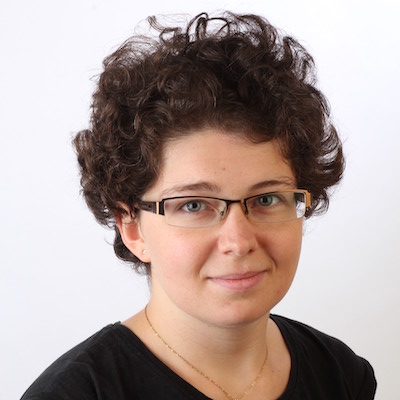
EMPA Dübendorf,
for her excellent and timely work in the field of metrology of clumped isotopes of nitrous oxides.
The award lecture takes place at the SCS Fall Meeting 2021 on September 10.
Simon-Widmer Award 2021
 Prof. Andrew deMello,
Prof. Andrew deMello,
ETH Zurich
for his great contributions to the field of bioanalytical science and microfluidic technology.
The award lecture takes place at the SCS Fall Meeting 2021 on September 10.
Dr. Max Lüthi Award 2021

ZHAW Wädenswil
für seine herausragende Bachelorarbeit „Chirale Selektoren für die Enantiomerentrennung kleiner chiraler Moleküle“.
and to
 Ms. Kristina Djordjevic,
Ms. Kristina Djordjevic,
FHNW Muttenz,
für ihre herausragende Bachelorarbeit „Generische SST`s im Kontext von HDX-MS Applikationen“
Grammaticakis-Neumann Award 2021
The SCS postponed the 2021 Grammaticakis-Neumann Award to 2022.
Balmer Prize 2021
No Prize is awarded in 2021. The next Prize will be in 2022.
Nomination deadline for the 2022 Awards is September 30, 2021.
scg.ch/awards
David Spichiger, SCS
10.12.2020
SCNAT Newsletter, December 2020
Zu viel Stickstoff und Phosphor in der Umwelt
Übermässige Stickstoff- und Phosphoreinträge schädigen Biodiversität, Wälder und Gewässer in der Schweiz, verstärken den Klimawandel und beeinträchtigen unsere Gesundheit. Weiter
Nachhaltige Entwicklung gezielt untersützen
Ein Whitepaper der Akademien der Wissenschaften Schweiz zeigt auf, welche Forschung die nachhaltige Entwicklung der Gesellschaft in der Schweiz bestmöglich unterstützt. Weiter
Das Forum zur Corona-Pandemie: Diskutieren Sie mit
Die wöchentliche Veranstaltung der Akademien der Wissenschaften fördert das Gespräch und den Austausch zwischen der Bevölkerung, den Behörden und der Wissenschaft. Weiter
Verbote bei fossilen Brenn- und Treibstoffen längerfristig kaum vermeidbar
Der Gegenentwurf des Bundesrates zur «Gletscher-Initiative» setzt wichtige Leitplanken für den Weg der Schweiz in Richtung Klimaneutralität. Die Vorgaben genügen aber laut den Akademien der Wissenschaften Schweiz noch nicht. So enthält der Entwurf zwar einen linearen Absenkpfad für den Ausstoss von Treibhausgasen bis 2050. Ein weitgehendes Verbot fossiler Brenn- und Treibstoffe schlägt der Bundesrat im Gegensatz zur Initiative nicht vor. Der Ausstieg aus fossilen Energien sei längerfristig aber kaum vermeidbar, wolle die Schweiz die Treibhausgasemissionen wirklich auf Netto Null senken, schreiben die Forschenden. Weiter
Forschung für gesellschaftliche Innovationen an Fachhochschulen
Fachhochschulen haben das grosse Potenzial, soziale Innovationen und gesellschaftliche Transformationsprozesse durch transdisziplinäre Forschung anzustossen und zu begleiten. Die neue Publikation des Netzwerks für transdisziplinäre Forschung beleuchtet Rahmenbedingungen und Handlungsfelder, damit diese Potenziale besser zum Tragen kommen. Weiter
Wie kann die Wissenschaft die Politik beraten?
Währen der Corona-Pandemie haben Wissenschaftlerinnen und Wissenschaftler mit der Swiss National Covid-19 Science Task Force in beispielloser Selbstorganisation Strukturen aufgebaut, die ein ständiges Reagieren auf die sich wandelnde Lage ermöglichen. Welche Lehren können aus der bisherigen Beratungstätigkeit gezogen werden? Wie kann die Wissenschaft die Politik in Zukunft beraten? Darüber unterhält sich Marcel Tanner, Präsident der Akademien der Wissenschaften Schweiz und Task-Force-Mitglied, an der virtuellen Podiumsdiskussion «Science after noon» am 17. Dezember 2020 mit Fachleuten. Weiter
Forschung im Ökosystem Wald
Die aktuelle Ausgabe der Nationalpark-Zeitschrift Cratschla, befasst sich mit dem Ökosystem Wald und seinen Leistungen. Forschende gehen den fortschreitenden Umweltveränderungen auf den Grund und thematisieren die Einflüsse des Menschen auf seine Mitwelt. Sie zeigen die komplexen Zusammenhänge auf und geben Antworten auf offene Fragen. Cratschla wird von der Forschungskommission des Schweizerischen Nationalparks der SCNAT herausgegeben. Weiter
Biosphärenreservate als Modellregionen einer nachhaltigen Entwicklung
Mit dem Sachbuch «Biosphäre 4.0» ist ein umfassendes Kompendium über Biosphärenreservate im deutschsprachigen Raum erschienen. Warum wurden sie gegründet? Wie werden sie verwaltet? Und was haben sie mit Nachhaltigkeit zu tun? Diese und weitere Fragen diskutieren namhafte Fachleute. Mitgewirkt hat auch das Forum Landschaft, Alpen, Pärke der SCNAT. Das Buch richtet sich an Forscherinnen, Praktiker, Parkmanagerinnen, Politiker und Wirtschaftstreibende. Weiter
Tatort Berg - Heldentaten, zwielichtige Geschäfte, Naturkatastrophen
An der Online-Veranstaltung des Alpinen Museums in Bern erzählen Menschen in rasanten Bildvorträgen, wie der Berg zum Tatort oder zum Täter wird. Heinrich Haller, ehemaliger Direktor des Nationalparks, weiss, wo gewildert wird. Wie Schutzwald und Klimawandel bestimmen, ob der Berg zum Täter wird, erforscht die Umweltnaturwissenschaftlerin Christine Moos. Heldentaten vollbringt der Rettungschef Marc Ziegler für die Alpine Rettung Grindelwald, während Maren Kern von Mountain Wilderness der Frage nachgeht, wie sich das Geschäft in den Bergen spurlos verrichten lässt. Der Anlass findet am 11. Dezember 2020 statt. Er wird vom Forum Landschaft, Alpen, Pärke der SCNAT mitorganisiert. Weiter
Citizen Science in der Schweiz vernetzen
Der Einbezug von Bürgerinnen und Bürger in die Forschung ist in der Schweiz auf fruchtbaren Boden gefallen. Seit mehreren Jahren werden Citizen-Science-Ansätze in verschiedenen Disziplinen und Zusammenhängen eingesetzt. «CitSci Helvetia 2021», die erste Schweizer Citizen-Science-Konferenz, bringt die Akteurinnen und Akteure zusammen, um die diversen Traditionen der Bürgerwissenschaft in der Schweiz zu entdecken und zu vernetzen. Die Veranstaltung findet am 14. und 15. Januar 2021 online statt. Mitveranstalterin ist das Kompetenzzentrum Science et Cité der Akademien der Wissenschaften Schweiz. Weiter
SWIFCOB 21: Biodiversität und Klima – die Transformation gemeinsam angehen
Die Tagung SWIFCOB 21 des Forums Biodiversität Schweiz der SCNAT bringt die beiden Themen Klima und Biodiversität mit ihren Communities zusammen, um gemeinsam über anstehende Herausforderungen und Lösungswege hinsichtlich des nötigen transformativen Wandels zu diskutieren. Die Veranstaltung findet am 5. Februar 2021 in Bern statt. Weiter
5th edition of the EurJOC Virtual Symposium – Meet the Chemists
The EurJOC editorial team together with chair Burkhard König are excited to announce the 5th edition of the EurJOC Virtual Symposium – Meet the Chemists.
Please join them and their speakers
M. Ángeles (Tati) Fernández-Ibáñez (University of Amsterdam) and
Joseph Moran (University of Strasbourg) for this exciting event.
When: Tuesday, December 15th, 2020 at 15:00 CET (UTC+2)
- 15:00 – 15:30: Tati Fernández-Ibáñez: Ligand-Promoted C-H Functionalization Reactions
- 15:30 – 16:00: Joseph Moran: Metabolism Before Enzymes
- 16:00 – 16:30: “Meet the Chemists” with Tati and Joseph (moderated by Burkhard König)
To join the event and ask questions, please register here.
For more upcoming virtual events from Chemistry please visit the Chemistry Europe Hub or the Chemistry Views site
Céline Wittwer, SCS
03.12.2020
Open Position @UniGE: Scientific Collaborator 2 (NCCR in Chemical Biology)
The NCCR in Chemical Biology is an internationally recognised centre of excellence in research in a new interdisciplinary field: chemical biology. To augment its drug discovery and target identification capacities the NCCR in Chemical Biology is seeking a
Scientific Collaborator 2
to manage a quantitative mass spectrometry (“‘omics”) platform at the UNIGE. This position will be well-integrated into the daily operations of the world-renown research groups within the sections of Chemistry and Biochemistry, and Biology and thus offers an innovative, interdisciplinary and stimulating scientific environment for the successful candidate.
Job Description
Propose, implement and provide analytical and quantitative mass spectrometry services: analysis of samples received from UNIGE users as well as users from external scientific or industrial institutions, the latter through the “Laboratory of Advanced Technology” https://lta-geneve.ch/
- Make available the platform tools to researchers, assist and advise them, supervise their handling of the equipment, and oversee the related analysis processes
- Ensure the optimal operation of the equipment, master all ad-hoc techniques and the platform’s analytical instruments (computational/bioinformatics pipeline)
- Presently the equipment infrastructure includes:
- Thermo Orbitrap Fusion Tribrid
- Thermo Q Exactive Plus, Advion Nanomate available, nano LC
- Thermo TSQ Vantage equipped with Advion Nanomate
- Waters Synapt G2-S with Ion Mobility
- GC-MS
- MALDI
- LR LC-MS
- Manage booking and billing necessities
- Further his/her education through participation in seminars, conferences, workshops
- Implement new experimental and bioinformatics techniques and analytical devices
- Participate in NCCR scientific projects
- Write scientific reports and co-write grant applications
- Teach mass spectrometry theory to undergraduate and graduate students
- Assist in the characterization of synthetic products
Job qualifications
PhD in Molecular Life Sciences, analytical chemistry or mass-spectrometry-related discipline
Several years’ experience in state-of-the-art quantitative mass spectrometry and related data storage and analyses. Requirement for experience in quantitative proteomics/phosphoproteomics and/or lipidomics/metabolomics.
The successful applicant will have excellent communication skills, be conscientious, rigorous, and efficient and have a well-developed sense of team spirit.
Starting date
June 1, 2021 or date to be agreed
More information
Visit the job portal website of University of Geneva
Applications should include:
- Cover letter
- Detailed CV together with a list of publications
- Copy of highest degrees/diploma
- Research and teaching statements
- List of referees who can later be contacted directly by the search committee. Recommendation letters are not requested for now.
Applications should be submitted exclusively on-line by clicking on this link. Apply now before December 18th, 2020 (23:59 Geneva time). APPLICATIONS SENT BY EMAIL SHALL NOT BE ACCEPTED.
Complementary information may be obtained at the following e-mail address:
David Spichiger, SCS
25.11.2020
Ruzicka-Prize 2020: Award Ceremony and Lecture via livestream
The Ruzicka-Prize is one of the most important prizes for the promotion of young scientists in the field of chemistry in Switzerland and is awarded annually by the D-CHAB.
This year, Dr. Patrick Hemberger (PSI) receives the Ruzicka-Prize 2020 for his research on understanding the mechanisms of catalytic fast pyrolysis by unveiling reactive intermediates in heterogeneous catalysts.
You are all cordially invited to join the Award Ceremony and Lecture on November 24, at 5:00 pm – due to the Corona pandemic this year via an YouTube livestream: https://video.ethz.ch/live/events/ruzicka.html.
More details can be found on the award homepage: https://chab.ethz.ch/en/research/awards-and-lectures/ruzicka-prize.html
Céline Wittwer, SCS
17.11.2020
Page 41 of 305


